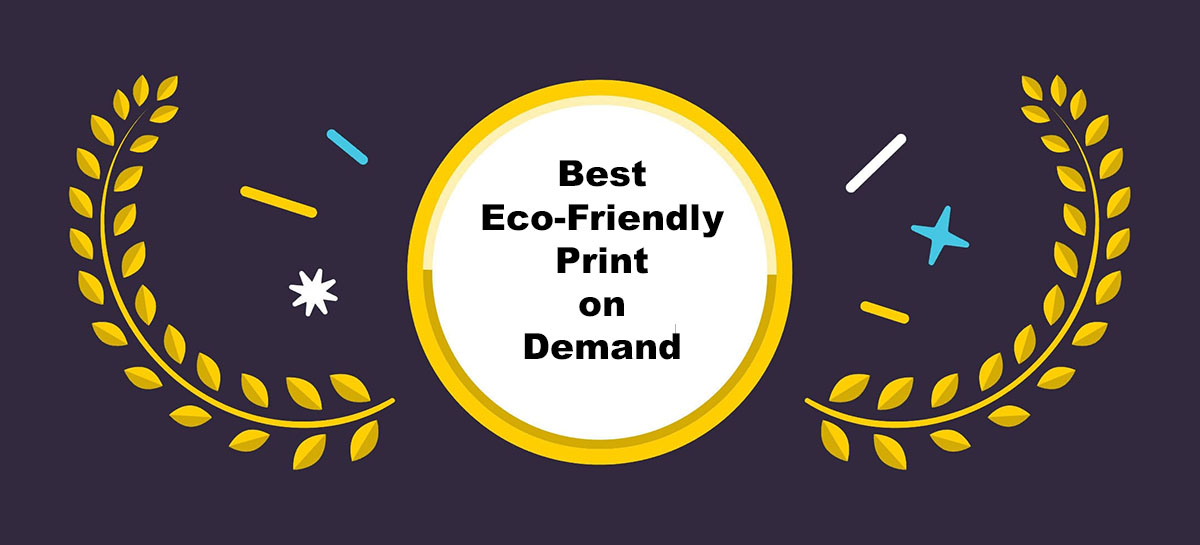Want to start an ecommerce business, sell custom products, and build a brand customers actually trust — without stocking inventory, printing items, or shipping boxes yourself? You can.
All you need is the right print-on-demand partner.
And if sustainability matters to you (or to your audience), then working with an eco-friendly POD company should be at the top of your list.
Eco POD partners handle the entire production process — from printing with water-based inks to shipping in plastic-free packaging — while you focus on designing products and growing your store. Whether you’re on Shopify, Etsy, or another ecommerce platform, they make it easy to offer high-quality, low-waste items that align with your brand values.
Based on my experience testing dozens of POD platforms, running my own stores, and helping others grow theirs, I’ve put together this list of the top print-on-demand companies that prioritize sustainability — without compromising on quality or delivery speed.
Why You Should Think About Shopify Before Choosing a POD Partner
Selling eco-friendly products through Etsy is a great starting point — it gives you organic traffic, built-in buyers, and an easy way to validate your product ideas. But relying on Etsy alone isn’t a long-term strategy.
If your goal is to build a real business, Shopify gives you full control over your brand and customer experience. No marketplace rules. No surprise fees. No risk of getting your account shut down overnight.
Here’s why I recommend pairing Shopify with your POD supplier:
- You own the customer data
- You can customize everything (domain, checkout, upsells, emails)
- You avoid marketplace fees eating into your margins
- You can still sell on Etsy and manage everything from one backend
- You build a brand that customers remember — not just another Etsy listing
Plenty of sellers start with Etsy and add Shopify later. But if you already know you want to scale, start with both. Most of the top POD platforms integrate with both seamlessly.
Now let’s get into the list — here are the best eco-friendly print-on-demand companies worth partnering with.
I’ll also share some tips for choosing the right one for your niche.
Comparison Table – Eco-Friendly POD Companies
| Company | Main Strength | Eco Features | Starting Price (USD) | Best For |
|---|---|---|---|---|
| Printful | Overall product variety | Water-based inks, recycled packaging | $9.75 | General ecommerce stores |
| T-Pop | Plastic-free shipping | 100% plastic-free, carbon offset | $8.50 | Eco-first brands |
| Gelato | Local production | FSC-certified paper, reduced shipping | $5.50 | Global shipping efficiency |
| Apliiq | Custom streetwear | Organic & recycled fabrics | $18.00 | Fashion brands |
| SPOD | Fast turnaround | Organic fabrics, OEKO-TEX inks | $8.00 | Time-sensitive orders |
| Prodigi | Wall art | FSC-certified, water-based inks | $1.50 | Artists & print sellers |
Why Eco-Friendly Print on Demand Matters
Sustainability isn’t just a marketing buzzword anymore — it’s a selling point that can make or break your business.
- Customer demand is rising: According to IBM, 78% of consumers say sustainability impacts their purchase decisions.
- You can justify higher prices: People are willing to pay more for eco-conscious products.
- It builds long-term trust: Eco promises backed by actual practices reduce return rates and complaints.
From an ecommerce perspective, going green with POD can help in multiple ways:
- Lower carbon footprint from localized production and efficient logistics.
- Less waste from made-to-order models.
- Better quality products that align with your brand’s mission.
If you’ve ever had a customer email you asking, “Is this organic cotton?” or “Why so much plastic in the packaging?” you know exactly why this matters.
How I Evaluated These Companies
I didn’t just Google “eco-friendly POD” and list the first names I saw. I looked at these key criteria:
- Materials: Do they use organic, recycled, or certified fabrics and papers?
- Printing technology: Are they using water-based inks or low-waste printing processes?
- Packaging: Is it recyclable, compostable, or plastic-free?
- Production locations: Do they produce closer to the end customer to reduce shipping emissions?
- Certifications: Things like OEKO-TEX, GOTS (Global Organic Textile Standard), and FSC matter here.
I also factored in:
- Product range
- Integration with ecommerce platforms
- Pricing and fulfillment speed
Top Eco-Friendly Print on Demand Companies
Below, I’ll go through my top picks. I’ve used some of these personally and researched others in-depth.
1. Printful – Best Overall for Eco-Friendly Options
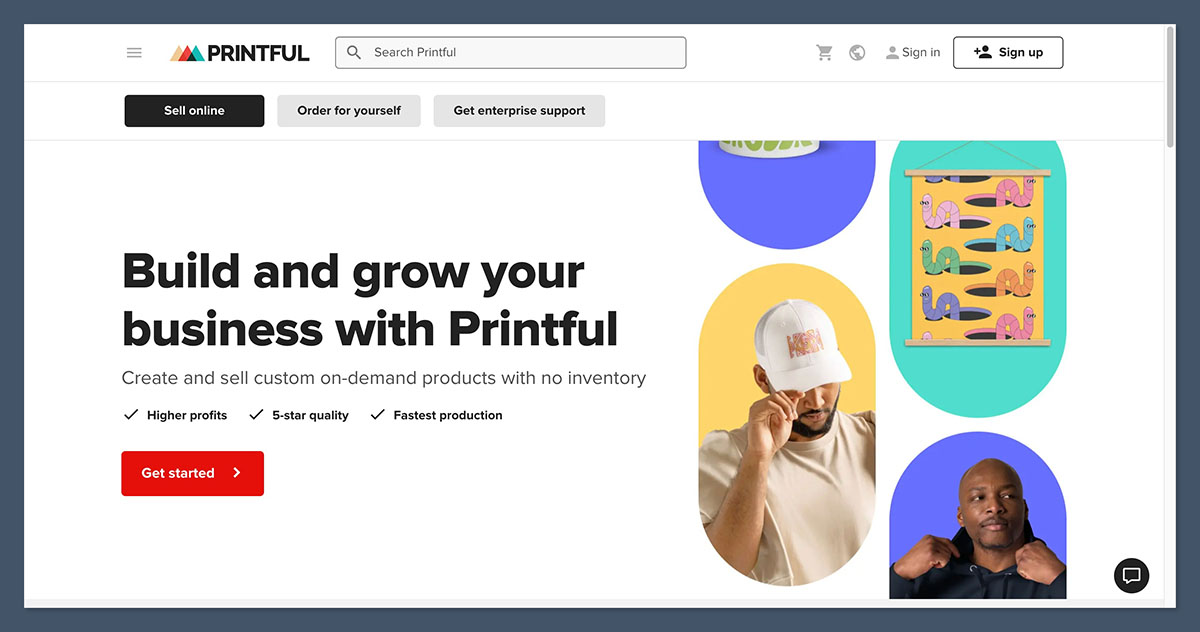
Printful is one of the biggest POD companies in the world, but they’ve made serious moves toward sustainability.
They now have a dedicated line of eco-friendly products, including organic cotton t-shirts, recycled polyester swimwear, and tote bags made from post-consumer materials
Eco credentials:
- Uses Kornit printers, which have almost zero wastewater and use water-based inks.
- Ships from multiple facilities worldwide, which reduces transport emissions.
- Offers packaging with post-consumer recycled content.
Products:
- Organic cotton t-shirts from $13.25
- Recycled polyester swimwear from $25.95
- Eco tote bags from $9.75
Pros:
- Huge product selection
- Easy integration with Shopify, Etsy, WooCommerce
- Multiple global warehouses
Cons:
- Higher base prices than some smaller providers
- Eco-friendly options are a fraction of total catalog
Who’s best for:
Printful is ideal for ecommerce sellers who want a large product catalog, professional integrations, and reliable worldwide shipping — with the bonus of a growing eco-friendly line.
If you want one POD partner that can handle everything while offering some sustainable products, this is your best bet.
2. T-Pop – Best for Plastic-Free Shipping
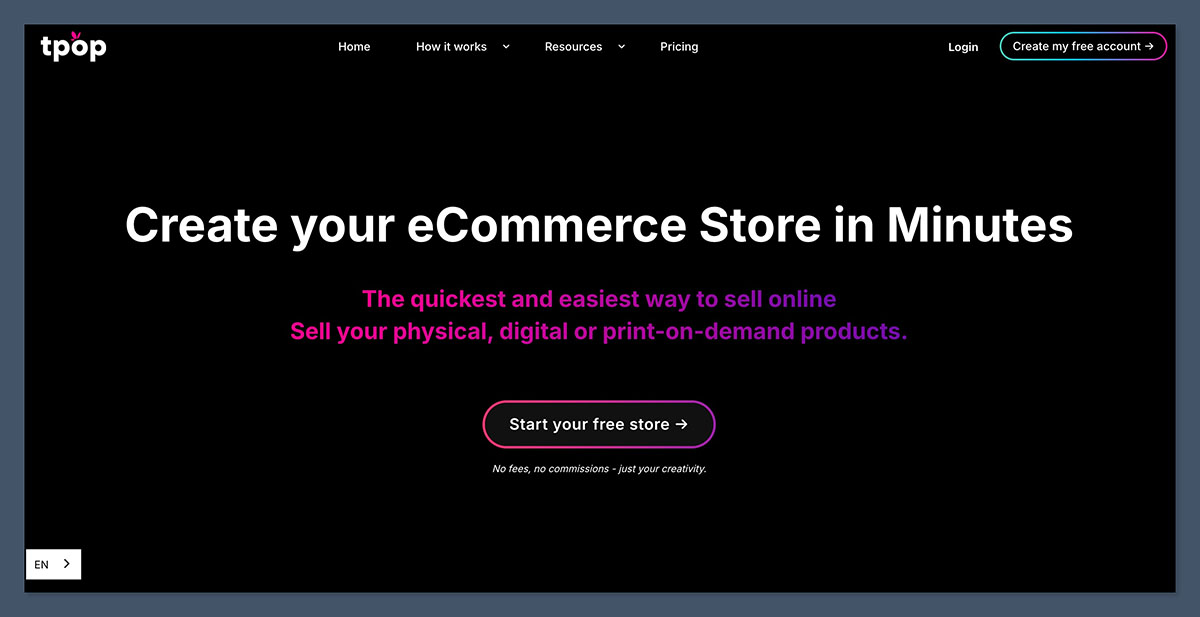
T-Pop is based in France and is the most “mission-driven” POD company I’ve found. Everything is plastic-free — from the kraft paper mailers to the paper tape.
They even include customizable packing slips without extra branding.
Eco credentials:
- 100% plastic-free packaging
- Uses water-based inks
- Offsets all carbon emissions from shipping
- Powered by renewable energy
Products:
- Organic cotton hoodies from $28.50
- Fair Wear-certified t-shirts from $15.90
- Organic tote bags from $8.50
Pros:
- Transparent sustainability policy
- Fully automated integrations with major ecommerce platforms
- Small but high-quality product range
Cons:
- Europe-focused (longer shipping times to US)
- Slightly slower fulfillment times
Who’s best for:
T-Pop is perfect for brands that want to lead with sustainability as their core selling point, especially if their customers are in Europe.
If plastic-free shipping and full carbon offsetting matter more than a huge product range, T-Pop delivers.
3. Gelato – Best for Localized Production
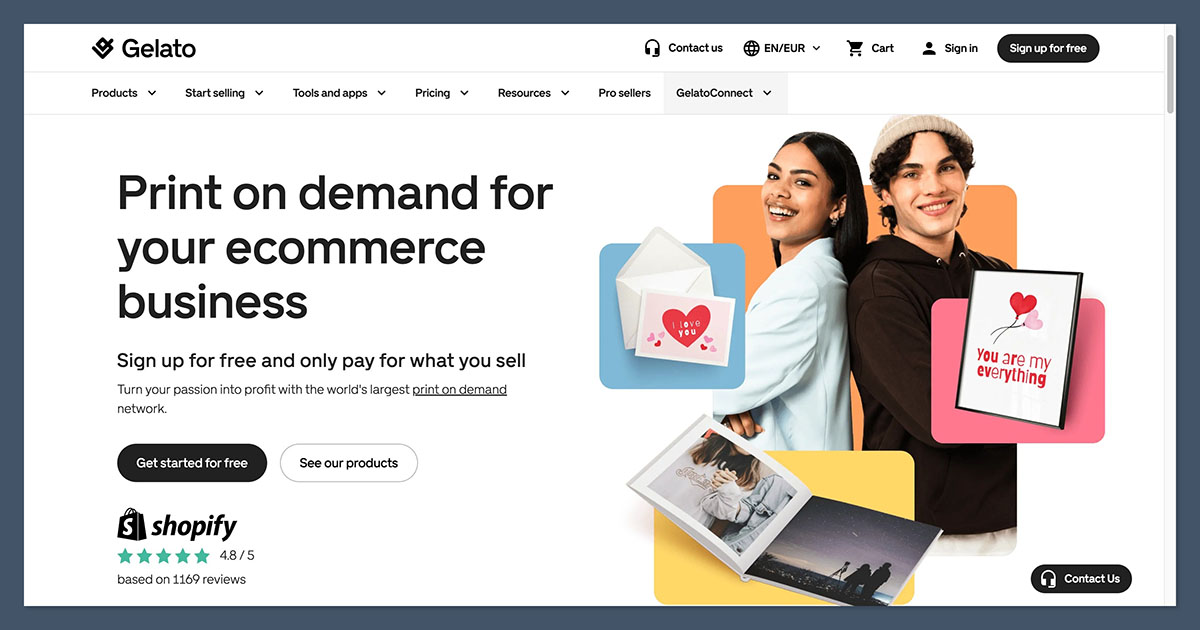
Gelato operates differently from most POD companies. They don’t have their own printing factories — instead, they partner with local printers in 32+ countries.
This means your product might be printed in the same country your customer lives in, which drastically reduces shipping emissions and time.
Eco credentials:
- Uses FSC-certified paper products and sustainable textiles
- Localized production cuts shipping distances by up to 90%
- Offers carbon offset options
Products:
- Posters from $5.50
- Organic cotton t-shirts from $14.90
- Photo books from $15.00
Pros:
- Very fast delivery due to local production
- Wide range of products
- Lower shipping emissions
Cons:
- Product quality can vary slightly between partners
- Limited control over exact printing location
Who’s best for:
Gelato works well for stores with international audiences who need fast delivery and lower shipping emissions.
If your customers are spread across multiple countries, this local production model is both eco-friendly and efficient.
4. Apliiq – Best for Custom Streetwear
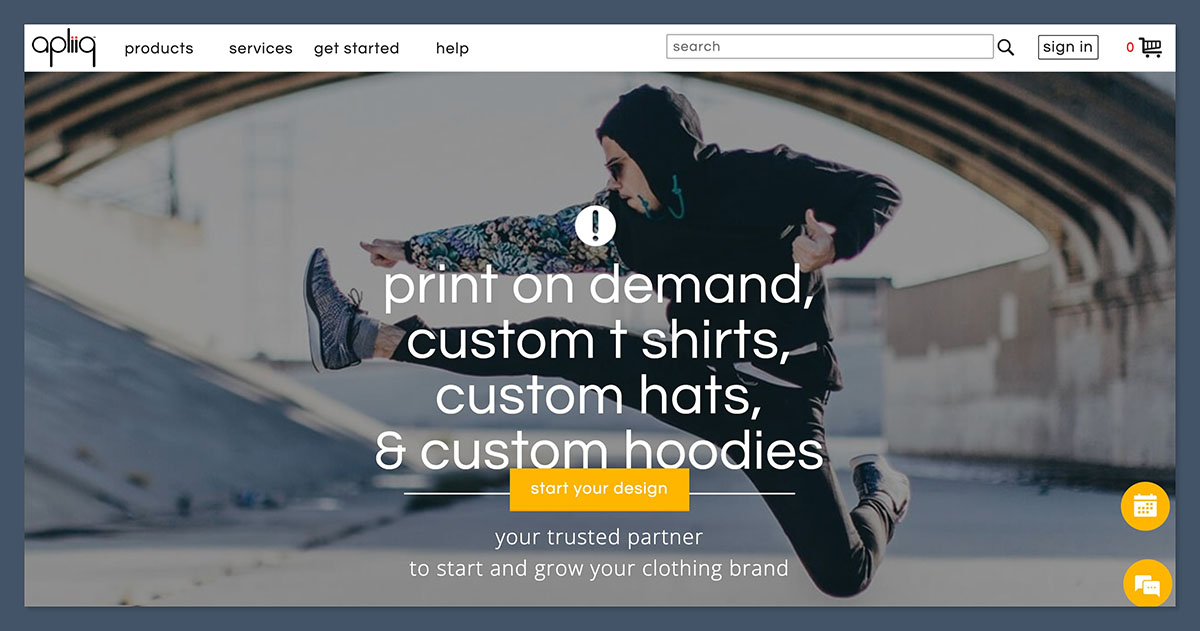
Apliiq is great if you want a streetwear or boutique fashion feel while staying sustainable. They offer made-to-order garments with options like organic cotton hoodies and recycled polyester jackets.
Eco credentials:
- Organic cotton options
- Made-to-order reduces waste
- Focus on small batch quality
Products:
- Organic hoodies from $32.00
- Recycled polyester jackets from $48.00
- Hemp blend tees from $18.00
Pros:
- High customization (labels, patches, embroidery)
- Ideal for fashion-forward brands
- US-based production
Cons:
- Higher price points
- Smaller eco-friendly catalog
Who’s best for:
Apliiq is a great choice for brands that want a unique, fashion-forward product line with strong branding options.
If you’re building a boutique clothing label and want sustainable fabric choices, Apliiq can give you that extra edge.
5. SPOD – Fastest Turnaround
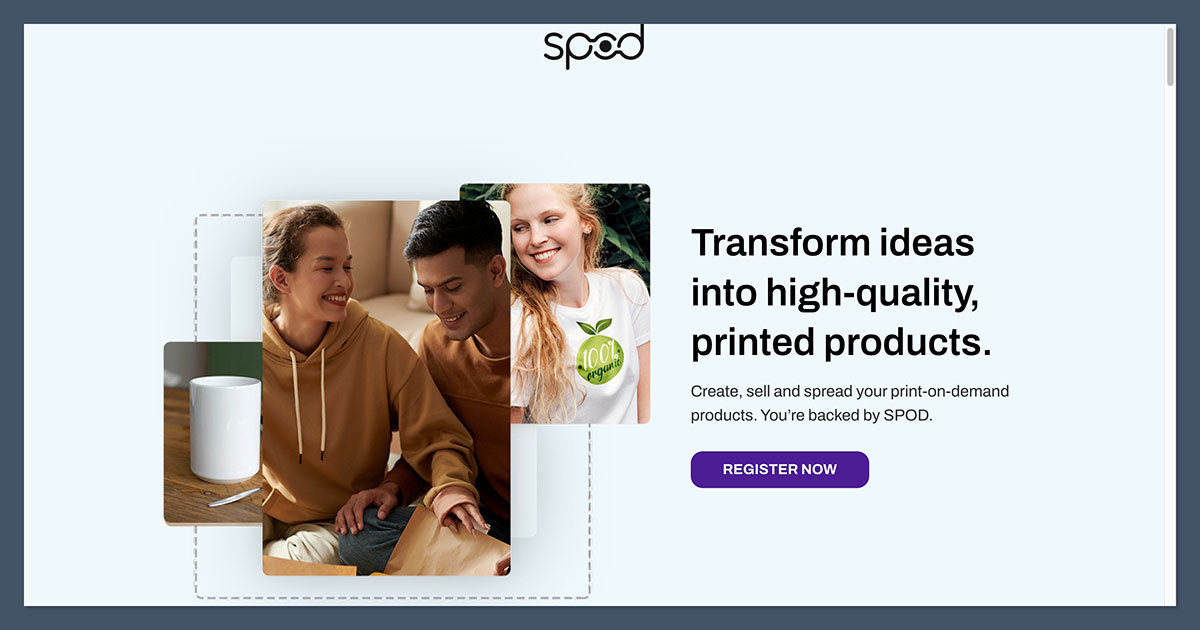
SPOD (owned by Spreadshirt) stands out for speed — most orders ship within 48 hours. They’ve also added organic textiles and OEKO-TEX-certified inks.
Eco credentials:
- Organic cotton apparel
- OEKO-TEX Standard 100 inks
- Energy-efficient production facilities
Products:
- Organic tees from $12.00
- Organic tote bags from $8.00
- Organic baby bodysuits from $14.50
Pros:
- Very fast turnaround
- Competitive pricing
- Strong ecommerce integrations
Cons:
- Smaller eco-friendly range
- Limited customization options
Who’s best for:
SPOD is best for ecommerce sellers who value speed above all else, but still want to offer organic and certified products.
If you often deal with last-minute orders or run time-sensitive promotions, SPOD’s quick fulfillment can be a big advantage.
6. Prodigi – Best for Wall Art
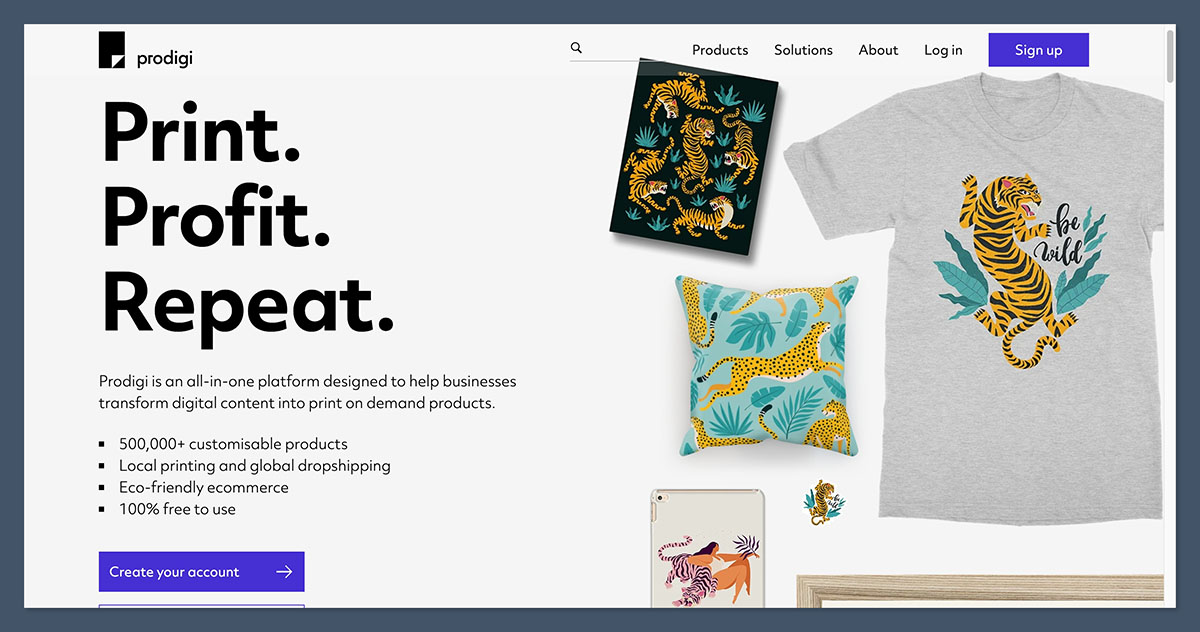
Prodigi is a UK-based POD that specializes in art prints, posters, and framed canvases. They use sustainably sourced paper and FSC-certified wood for frames.
Eco credentials:
- FSC-certified papers and frames
- Uses water-based inks
- Ships locally via a global network
Products:
- Posters from $6.00
- Framed prints from $22.00
- Greeting cards from $1.50
Pros:
- Excellent print quality
- Strong sustainable sourcing
- Fast delivery for paper goods
Cons:
- Narrow product focus
- Limited apparel options
Who’s best for:
Prodigi is ideal for artists, photographers, or stores that sell wall art and paper goods.
If your focus is on prints rather than apparel, and you want sustainably sourced materials, this is one of the strongest options available.
What to Look For When Choosing an Eco-Friendly POD Supplier
Even if a company markets itself as “eco-friendly,” you’ll want to dig deeper. Here’s my personal checklist:
- Certifications: GOTS, OEKO-TEX, FSC — these prove eco claims.
- Inks: Water-based inks are less harmful than plastisol.
- Fabric origin: Organic cotton should be certified, not just “organic-style.”
- Packaging: Look for compostable mailers, paper tape, no polybags.
- Production model: Made-to-order beats bulk storage.
- Location: Local or regional production reduces shipping emissions.
It’s also worth checking how transparent a supplier is with their sustainability reporting. Some companies release annual environmental impact reports that detail their emissions, waste reduction, and sourcing practices.
If a POD provider is willing to share this data publicly, it’s usually a sign that they take their eco commitments seriously rather than treating them as a marketing hook.
How Eco-Friendly POD Impacts Your Business
Switching to an eco-friendly supplier isn’t just about feeling good — it can boost your bottom line:
- Brand perception: Customers see you as a responsible business.
- Higher margins: You can price sustainably made products higher.
- Better retention: Eco-conscious customers are loyal customers.
- Reduced returns: Better quality control and materials lead to fewer returns.
Another benefit I’ve noticed is the positive press and social media engagement that can come from making sustainable choices.
When your brand shares behind-the-scenes stories about switching to organic fabrics or reducing plastic waste, customers often share that content — and that kind of organic reach is priceless compared to paid ads.
Final Thoughts
The best eco-friendly print-on-demand company for you depends on your audience, products, and location.
If you need the widest range, Printful is a great starting point.
If you want total sustainability and don’t mind a smaller catalog, T-Pop is hard to beat.
And if you’re shipping globally, Gelato’s local production model is the most eco-conscious.
The key is to match your brand values with your supplier’s actual practices — not just their marketing claims.
Your customers will notice the difference, and so will your sales over time.
The reality is that no POD supplier is 100% sustainable, but some are taking real, measurable steps toward minimizing their footprint.
By aligning with those companies and communicating that commitment to your customers, you not only help the planet but also create a stronger, more authentic brand story.
